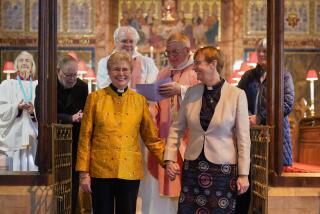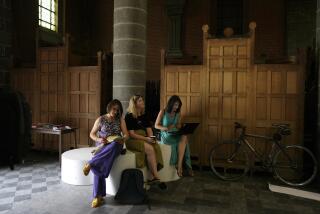Seeking to Find Unity
- Share via
There was a Christmas past when going to church was a painful time for Joan Brown Campbell.
Members of her extended family included Roman Catholics, Presbyterians, Episcopalians and Disciples of Christ. So when the family gathered at Christmas, there was tension over which church to attend.
“When I was growing up, those were painful considerations. You had to choose,” said Campbell, the departing general secretary of the National Council of Churches and an ordained Disciples of Christ minister. “In our house, you’d better not think about marrying a Catholic, and maybe not a Methodist,” she remembered.
Today, however, such arguments have faded, she said. Family members are comfortable attending one another’s churches.
Likewise, Daniel Becerril, a Pentecostal Christian who lives in Carson, remembers warning Catholic relatives when he was 15 that they were going to hell.
“I was young and dumb,” said Becerril, now 23. “We both worship the same God,” he said, though he still doesn’t consider the Catholics in his family to be Christians.
Lingering disputes and reconciliation of religious differences within families, made all the more poignant at Christmas, reflect both the divisions that have fractured the church for nearly a thousand years and worldwide efforts to bring about Christian unity.
Now, as Christianity is poised on the eve of its third millennium, church leaders and congregants alike wonder if the next century will make real Jesus’ prayer recorded in John 17:23 that his followers “may become completely one.”
The idea of unity remains for most Christians a powerful vision, one sure to be reflected next month in the faces of those who join Pope John Paul II when he ceremonially opens the “Holy Door” of St. Paul’s Church in Rome to mark the beginning of the Great Jubilee of the year 2000.
Many Denominations Will Be in Rome
It will be the first time in history that a pope will personally open the door. As he does so, his act will be witnessed by his invited guests from major Christian denominations and organizations worldwide, from the Orthodox churches to American Baptists.
That gathering symbolizes the steps toward unity that have been made in the last generation.
“In the course of these last decades, the churches have moved together in ways that were unthinkable at the beginning of the century,” said the Rev. Konrad Raiser, general secretary of the World Council of Churches, a fellowship of 336 churches in 100 countries, headquartered in Geneva. “The hoped-for visible unity has not been achieved, but relations between the churches have changed in an irreversible manner.”
Last October, the Roman Catholic Church and Lutheran World Federation put aside a 500-year-old theological dispute about how sinners are saved that precipitated Martin Luther’s 16th century Protestant Reformation and the Thirty Years War. Their remaining differences are no longer “church dividing,” the churches declared.
In August, the largest Lutheran denomination in the country, the 5.1-million-member Evangelical Lutheran Church, approved an agreement with the Episcopal Church to recognize the validity of each other’s sacraments and clergy.
The Church of England and the Lutheran Church approved a similar agreement in England, as have Lutherans and Reform churches in Europe. The Evangelical Lutheran Church in America has also signed ecumenical accords with the Presbyterian Church, U.S.A.; the United Church of Christ; the Reformed Church in America; and the Moravian Church in America.
At the same time, the Vatican has also reached agreements with the Oriental Coptic Church in Egypt, the Armenian Church in Armenia, the Assyrian Orthodox Church and some Syrian churches in India to end a dispute over the nature of Christ that dates to the year 431.
Faith Isn’t the Same as Church
Those decisions among church leaders and national and international religious bodies, however, have already been superseded by a spiritual ecumenicism at the grass roots. Church traditions, laws and organizational boundaries are irrelevant to an increasing number of people.
“When I was growing up I could never have imagined one of my Protestant friends wanting to go to Communion in a Catholic church,” said Brother Jeff Gros of the Ecumenical and Religious Affairs office of the National Conference of Catholic Bishops. “They used to joke about our antiquated 1/8rituals 3/8 and kind of ‘idolatrous’ practices. Now the question is, how do we get through our differences in a common ministry so we can come to a common table?”
“I think people continue to take faith very seriously,” said Campbell. “I’m not sure they take church very seriously.”
But while denominations may be less meaningful than ever--particularly in the United States and Western Europe--the established churches remain major institutions in society, and many barriers remain to truly unifying them.
Indeed, despite the advances that have taken place, some scholars refer to the 1990s as a “decade of the ecumenical winter.” Most of the decade’s agreements have been between Protestants, or between Protestants and Anglicans. The accord between Rome and the Lutheran World Federation is the one major exception.
And the agreements that have been reached have not been universally welcomed. The conservative Lutheran Church, Missouri Synod, decried the agreement between Rome and the Lutheran World Federation. And the agreement between the Evangelical Lutheran Church of America and the Episcopal Church has prompted a few Lutheran congregations to leave their denomination.
The great schism between the Roman Catholic Church and Eastern Orthodoxy, which is the oldest rift within Christianity--begun during the 9th century and made final by the 11th century--in many ways remains as intractable as ever.
At the same time, some Orthodox churches have become concerned with the liberal direction of the National Council of Churches and the World Council of Churches. At issue are matters such as whether women should be ordained and how affirming churches should be toward homosexuals.
The decision by Anglican churches, including the Episcopal Church in the United States, to ordain women has been called a “grave obstacle” toward reunification by Pope John Paul II.
Relations between Catholics and the Southern Baptist Convention have also cooled.
“It’s a very fragile process,” said Brother Gros of the National Conference of Catholic Bishops. “They’re under a lot of pressure from people who don’t want them to be involved with the Catholics. The fact that 1/8conversations 3/8 exist at all is somewhat of a miracle.”
Some disputes, such as the turf battles over which church controls what part of the Church of the Holy Sepulcher in Jerusalem, have embarrassed Christians the world over.
“It has taken three years to get the Christian custodians to agree that a sewer cover (on the church grounds) should be removed and the sewer replaced,” the Most Rev. Desmond Tutu, the retired Anglican archbishop of Johannesburg, South Africa, said earlier this month at a meeting of church leaders in Atlanta. “If Christ had not risen from the dead, we would say he is turning in his grave.”
Still, those close to developments say that the progress to date should not be minimized.
“I hear people talk about the winter of ecumenism,” said the Rev. Canon David Perry, deputy for ecumenical and inter-religious affairs for the Episcopal Church. But, he said, work is moving apace. “This is the work of the Holy Spirit. The spirit is leading us into those places where we may see things differently and hear things differently as a result of our conversations.”
Such is the case within the international Roman Catholic-Pentecostal Dialogue--one of the longest-running modern conversations between churches. Rome and Pentecostal churches are beginning to look at each other differently, said Cecil M. Robeck Jr., professor of church history and ecumenics at Fuller Theological Seminary in Pasadena.
“There will be no visible unity in the near future, but I do think a greater level of cooperation can occur,” said Robeck, who is co-chairman of the Roman Catholic-Pentecostal Dialogue. “I think it’s only going to get better.”
More to Read
Sign up for Essential California
The most important California stories and recommendations in your inbox every morning.
You may occasionally receive promotional content from the Los Angeles Times.













